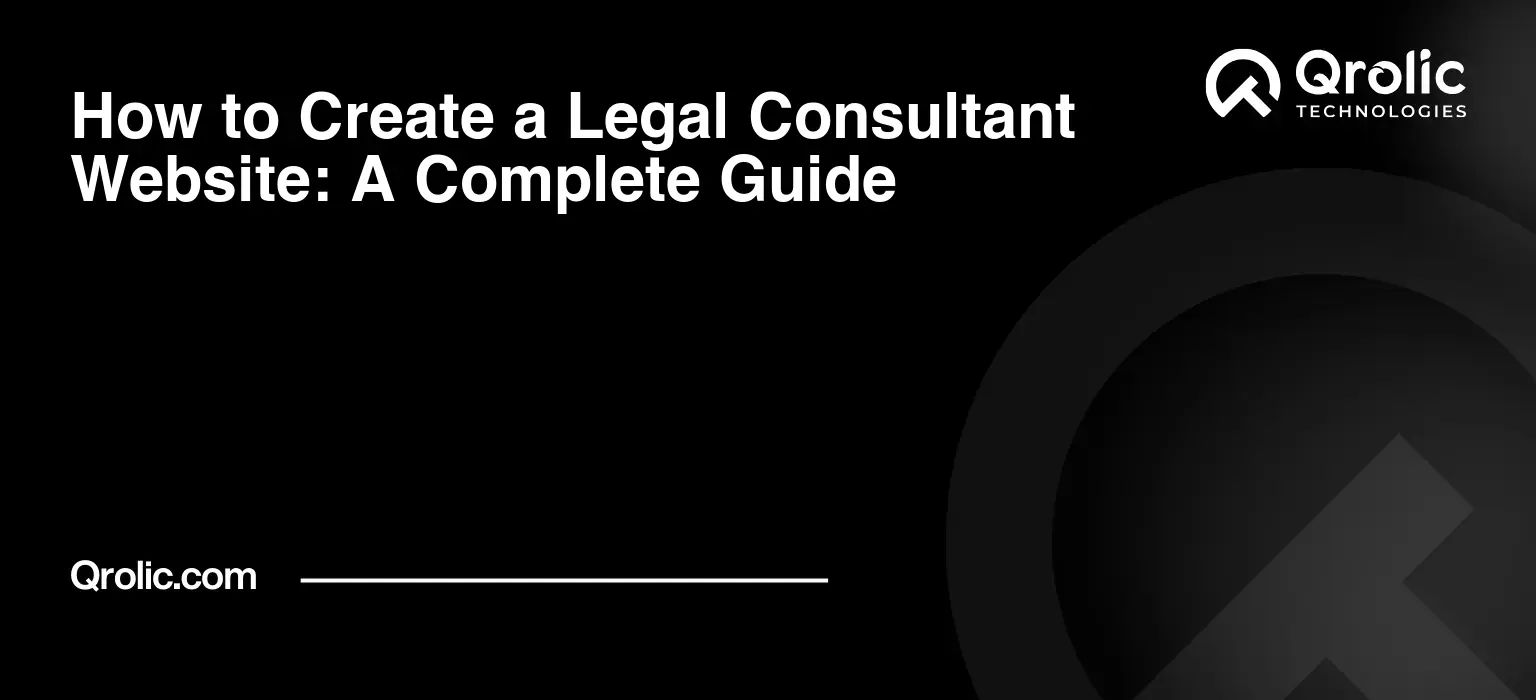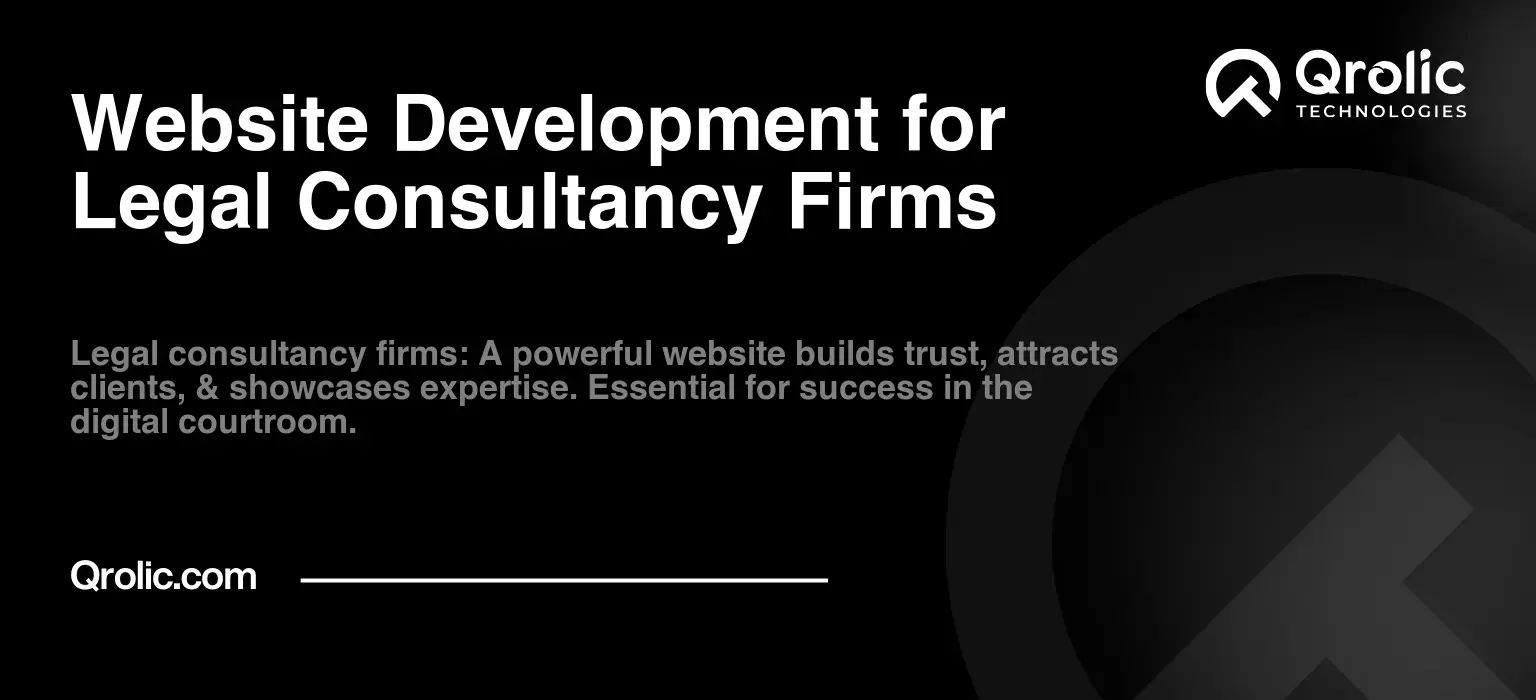Quick Summary:
- Plan your website by defining audience and goals.
- Build a professional, mobile-friendly site with good content.
- Optimize your site for search engines and user experience.
- Ensure legal compliance and consistent website maintenance.
Table of Contents
- Why Your Legal Consultancy Needs a Website (More Than Ever Before)
- Establishing Authority and Trust: Your Digital Law Firm
- Expanding Your Reach and Attracting New Clients: The 24/7 Marketing Machine
- Improving Client Communication and Efficiency: Streamlining Your Practice
- Staying Competitive in the Legal Landscape: The Digital Advantage
- Phase 1: Planning Your Legal Consultancy Website – Laying the Foundation for Success
- 1. Defining Your Target Audience and Their Needs
- 2. Defining Your Website’s Goals and Objectives
- 3. Conducting Keyword Research: The Foundation of SEO
- 4. Defining Your Website’s Structure and Navigation
- 5. Content Planning: What Will Your Website Say?
- Phase 2: Designing and Developing Your Legal Consultancy Website – Bringing Your Vision to Life
- 1. Choosing a Domain Name and Hosting Provider
- 2. Selecting a Website Platform (CMS): WordPress vs. Others
- 3. Choosing a Website Theme: Design That Speaks “Legal Professionalism”
- 4. Developing Essential Website Pages and Content
- 5. Implementing Essential Plugins: Functionality and Security
- Phase 3: Optimizing Your Legal Consultancy Website – Driving Traffic and Generating Leads
- 1. On-Page SEO Optimization: Making Your Website Search-Engine Friendly
- 2. Off-Page SEO Optimization: Building Authority and Backlinks
- 3. Content Marketing Strategy: Creating Valuable and Engaging Content
- 4. Website Analytics and Tracking: Measuring Your Success
- 5. Conversion Rate Optimization (CRO): Turning Visitors into Clients
- Qrolic Technologies: Your Partner in Building a Successful Legal Consultancy Website
- Staying Compliant: Legal Considerations for Your Website
- The Long Game: Maintaining and Updating Your Legal Consultancy Website
Why Your Legal Consultancy Needs a Website (More Than Ever Before)

In today’s digital age, a legal consultancy without a website is like a lawyer showing up to court without a briefcase. It’s not just about having an online presence; it’s about credibility, accessibility, and the ability to connect with potential clients in a way that’s simply impossible offline. Let’s dive into why a website is absolutely essential for your legal consultancy:
Establishing Authority and Trust: Your Digital Law Firm
Think of your website as your digital law firm. It’s the first impression many potential clients will have of your consultancy. A well-designed, informative website instantly establishes authority and builds trust. It shows you’re serious, professional, and invested in providing valuable information to those seeking legal guidance.
- Showcasing Expertise: A website provides a platform to showcase your expertise through blog posts, articles, case studies, and even short videos. This demonstrates your deep understanding of legal issues and helps potential clients see you as a knowledgeable and reliable resource.
- Building Credibility with Testimonials: Client testimonials are powerful trust signals. Featuring positive reviews and success stories on your website can significantly influence potential clients’ decisions. Let their voices speak for you and build confidence in your services.
- Transparency and Openness: A well-structured website provides essential information about your consultancy, including your mission, values, team members, and areas of practice. This transparency fosters trust and encourages potential clients to reach out.
Expanding Your Reach and Attracting New Clients: The 24/7 Marketing Machine
Your website works 24/7, 365 days a year, marketing your services even when you’re not actively working. It’s a tireless engine for generating leads and attracting new clients from a wider geographical area.
- Reaching a Wider Audience: Unlike traditional marketing methods, a website allows you to reach potential clients beyond your immediate location. People searching online for legal services in your area of expertise can easily find you, regardless of where they are located.
- Attracting Qualified Leads Through SEO: Search Engine Optimization (SEO) is crucial for driving organic traffic to your website. By optimizing your website with relevant keywords (like “legal consultancy website”, “law design”, “essential steps”), you can attract potential clients actively searching for legal services like yours. We’ll delve into SEO strategies in more detail later.
- Providing Convenient Access to Information: Your website serves as a central hub for all essential information about your consultancy. Potential clients can easily find answers to their questions about your services, fees, and contact information, empowering them to make informed decisions.
Improving Client Communication and Efficiency: Streamlining Your Practice
A website can significantly improve client communication and streamline your practice, freeing up your time to focus on what you do best: providing exceptional legal services.
- Online Contact Forms and Consultation Requests: Implementing online contact forms and consultation request features allows potential clients to easily reach out to you with their inquiries. This eliminates phone tag and ensures you receive all necessary information upfront.
- FAQs and Resource Centers: Creating a comprehensive FAQ section and resource center on your website can answer common client questions, reducing the number of repetitive inquiries you receive. This saves you time and allows clients to find quick answers to their basic questions.
- Client Portals for Secure Communication: Consider implementing a secure client portal on your website. This allows for secure communication, document sharing, and progress updates, enhancing client satisfaction and streamlining your workflow.
Staying Competitive in the Legal Landscape: The Digital Advantage
In today’s competitive legal landscape, having a strong online presence is no longer optional; it’s a necessity. A website gives you a significant digital advantage and helps you stay ahead of the curve.
- Differentiation from Competitors: A well-designed website can help you stand out from the competition and showcase your unique value proposition. Highlight your areas of expertise, your approach to legal services, and your commitment to client satisfaction.
- Adapting to Changing Client Expectations: Clients increasingly expect to find information and interact with businesses online. Having a website demonstrates that you are responsive to these changing expectations and committed to providing a modern, convenient experience.
- Building a Brand Identity: Your website is a crucial element of your brand identity. It allows you to communicate your values, personality, and expertise in a consistent and professional manner.
In short, a website is not just a luxury for legal consultancies; it’s a fundamental tool for success in the digital age. It builds trust, expands your reach, improves communication, and helps you stay competitive.
Phase 1: Planning Your Legal Consultancy Website – Laying the Foundation for Success
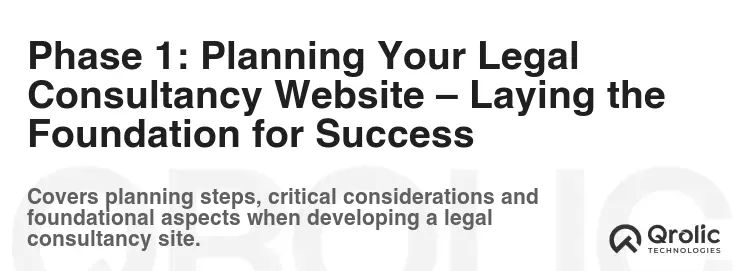
Before you even think about design or code, a robust planning phase is crucial. This is where you define your website’s purpose, target audience, and overall strategy.
1. Defining Your Target Audience and Their Needs
Who are you trying to reach? Knowing your ideal client is paramount.
- Identify Specific Demographics: Are you targeting individuals, small businesses, corporations, or a niche market within a specific industry? Understanding their demographics (age, income, location, industry) will inform your website’s design, content, and marketing strategy.
- Understand Their Pain Points: What legal issues are your target clients facing? What challenges are they trying to overcome? Your website should address these pain points directly and offer solutions.
- Research Their Online Behavior: Where do your target clients spend their time online? What keywords are they using to search for legal services? This information will help you optimize your website for search engines and attract the right kind of traffic.
Example: Let’s say you specialize in intellectual property law for startups. Your target audience is tech entrepreneurs aged 25-45, located primarily in urban areas, who are looking for affordable and reliable legal advice to protect their innovations. Their pain points include understanding patent law, trademarking their brands, and navigating complex licensing agreements.
2. Defining Your Website’s Goals and Objectives
What do you want your website to achieve?
- Generate Leads: This is a common goal for most legal consultancies. Your website should be designed to capture leads through contact forms, consultation requests, and email subscriptions.
- Build Brand Awareness: Your website can help you establish your brand identity and increase awareness of your services among your target audience.
- Provide Information and Resources: Your website can serve as a valuable resource for potential clients, providing information about legal topics, case studies, and industry news.
- Improve Client Communication: Your website can streamline communication with existing clients through secure client portals and online communication tools.
- Increase Sales/Revenue: Ultimately, the goal of your website is to drive more business to your legal consultancy.
Example: For the intellectual property law consultancy targeting startups, the website’s goals might include: generating 50 qualified leads per month, increasing brand awareness among tech entrepreneurs by 20% in the first year, and providing a valuable resource for startups seeking information about intellectual property law.
3. Conducting Keyword Research: The Foundation of SEO
Keywords are the words and phrases people use to search for information online. Identifying the right keywords is crucial for optimizing your website for search engines.
- Brainstorming: Start by brainstorming a list of keywords related to your legal services and target audience. Think about what terms people might use to find your consultancy. (e.g., “intellectual property lawyer for startups,” “patent attorney,” “trademark registration,” “startup legal advice”)
- Using Keyword Research Tools: Use tools like Google Keyword Planner, Ahrefs, SEMrush, or Moz Keyword Explorer to research the search volume and competition for your target keywords.
- Analyzing Competitor Websites: Analyze the websites of your competitors to see what keywords they are targeting.
- Focus on Long-Tail Keywords: Long-tail keywords are longer, more specific phrases that target a narrower audience. These keywords often have lower search volume but higher conversion rates. (e.g., “affordable intellectual property lawyer for startups in San Francisco”)
- Creating a Keyword Map: Organize your keywords into a keyword map, assigning each keyword to a specific page on your website.
Example: For the intellectual property law consultancy, the keyword map might include:
* **Homepage:** "Intellectual property lawyer for startups," "patent attorney," "trademark registration"
* **Services Page:** "Patent application process," "trademark search," "copyright protection," "licensing agreements"
* **Blog:** "Protecting your invention," "trademarking your brand," "copyright tips for startups"4. Defining Your Website’s Structure and Navigation
A clear and intuitive website structure is essential for user experience and SEO.
- Plan Your Site Architecture: Create a sitemap that outlines the main pages and subpages of your website. (e.g., Homepage, About Us, Services, Blog, Contact Us, Client Portal)
- Create a Logical Navigation Menu: Design a navigation menu that is easy to understand and use. Make sure all important pages are easily accessible from the homepage.
- Use Internal Linking: Link to relevant pages within your website to improve user experience and SEO.
- Consider User Flow: Think about how users will navigate through your website to find the information they need.
Example: A simple and effective website structure for the intellectual property law consultancy might include:
* **Homepage:** Introduction to the consultancy, key services, testimonials, contact information
* **About Us:** Background of the firm, team members, mission statement
* **Services:** Detailed descriptions of patent law, trademark registration, copyright protection, licensing agreements
* **Blog:** Articles and resources on intellectual property law for startups
* **Contact Us:** Contact form, phone number, email address, map5. Content Planning: What Will Your Website Say?
High-quality, engaging content is the heart of any successful website.
- Create a Content Inventory: List all the content you will need for your website, including text, images, videos, and other multimedia elements.
- Write Compelling Website Copy: Your website copy should be clear, concise, and persuasive. Focus on the benefits of your services and how you can help your target audience solve their legal problems.
- Develop a Blog Strategy: A blog is a great way to attract new visitors to your website, establish your expertise, and improve your SEO. Plan to publish regular blog posts on relevant topics.
- Gather Testimonials and Case Studies: Testimonials and case studies are powerful social proof elements that can help build trust and credibility.
Example: Content ideas for the intellectual property law consultancy include:
* **Homepage:** A clear and concise explanation of the consultancy's services and value proposition, accompanied by compelling visuals.
* **About Us:** Biographies of the team members, highlighting their expertise and experience in intellectual property law.
* **Services:** Detailed explanations of each service, including patent law, trademark registration, and copyright protection, with clear calls to action.
* **Blog:** Articles on topics such as "How to Patent Your Invention," "Trademarking Your Brand," and "Understanding Copyright Law for Startups."
* **Testimonials:** Positive reviews from satisfied clients, highlighting the consultancy's expertise and professionalism.
* **Case Studies:** Examples of successful intellectual property cases handled by the consultancy.Phase 2: Designing and Developing Your Legal Consultancy Website – Bringing Your Vision to Life
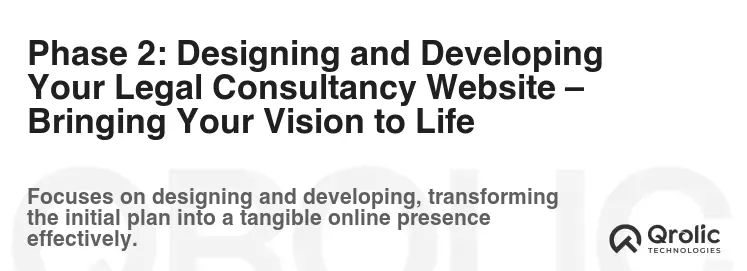
With your planning phase complete, it’s time to focus on the visual design and technical development of your website. This is where your website starts to take shape.
1. Choosing a Domain Name and Hosting Provider
Your domain name is your website’s address on the internet. Choosing the right domain name and hosting provider is crucial for your website’s success.
- Domain Name Selection:
- Keep it Short and Memorable: Choose a domain name that is easy to remember and type.
- Use Relevant Keywords: Include relevant keywords in your domain name to improve your SEO.
- Choose the Right Extension: The most common domain extension is .com, but you may also consider using .net, .org, or a country-specific extension like .ca or .uk.
- Check Availability: Make sure the domain name you want is available before you register it.
- Hosting Provider Selection:
- Consider Your Needs: Choose a hosting provider that meets your website’s specific needs, such as storage space, bandwidth, and security features.
- Check Uptime and Reliability: Look for a hosting provider with a high uptime guarantee and a reputation for reliability.
- Consider Customer Support: Choose a hosting provider that offers excellent customer support in case you need help with your website.
- Read Reviews: Read reviews of different hosting providers before making a decision.
Example: For the intellectual property law consultancy, potential domain names might include:
* "StartupIPLaw.com"
* "IntellectualPropertyForStartups.com"
* "YourStartupLawyer.com"Popular hosting providers include:
* Bluehost
* SiteGround
* HostGator
* WP Engine2. Selecting a Website Platform (CMS): WordPress vs. Others
A Content Management System (CMS) allows you to easily manage and update your website’s content without any coding knowledge.
- WordPress: WordPress is the most popular CMS in the world, powering over 40% of all websites. It’s a versatile and user-friendly platform with a large community of developers and a vast library of plugins and themes.
- Pros:
- Easy to use
- Highly customizable
- Large community of developers
- Vast library of plugins and themes
- SEO-friendly
- Cons:
- Can be vulnerable to security threats if not properly maintained
- Requires some technical knowledge to customize advanced features
- Pros:
- Other CMS Options: Other popular CMS options include:
- Joomla: A more complex CMS than WordPress, but offers more advanced features.
- Drupal: A highly customizable CMS that is popular with developers, but can be difficult for beginners to use.
- Wix/Squarespace: Website builders that offer a drag-and-drop interface, making them easy to use for beginners, but they are less customizable than WordPress.
Recommendation: For most legal consultancies, WordPress is the best choice due to its ease of use, versatility, and SEO-friendliness.
3. Choosing a Website Theme: Design That Speaks “Legal Professionalism”
Your website’s theme is the visual design template that determines the look and feel of your website.
- Choose a Professional and Modern Design: Select a theme that reflects the professionalism and trustworthiness of your legal consultancy. Avoid themes that are too flashy or trendy.
- Ensure Mobile Responsiveness: Make sure your theme is mobile-responsive, meaning it will look good on all devices, including smartphones and tablets.
- Consider Your Brand Identity: Choose a theme that aligns with your brand identity, including your logo, colors, and typography.
- Check for Customization Options: Make sure the theme offers sufficient customization options to allow you to tailor it to your specific needs.
- Read Reviews: Read reviews of different themes before making a decision.
Example: Popular WordPress themes for legal consultancies include:
* Avada
* Divi
* Astra
* OceanWP4. Developing Essential Website Pages and Content
Now it’s time to populate your website with high-quality content.
- Homepage: The first impression is crucial. Clearly state your value proposition, highlight your key services, and include a strong call to action.
- About Us: Tell your story. Share your mission, values, and the expertise of your team members. Build trust and credibility.
- Services: Describe your services in detail, highlighting the benefits and how you can help your clients solve their legal problems. Use clear and concise language.
- Blog: Regularly publish informative and engaging blog posts on relevant legal topics. Establish your expertise and attract new visitors to your website.
- Contact Us: Make it easy for potential clients to reach you. Include a contact form, phone number, email address, and map.
- Testimonials/Case Studies: Showcase your success stories and build trust with potential clients.
- Privacy Policy/Terms of Service: Ensure you have the necessary legal disclaimers in place.
5. Implementing Essential Plugins: Functionality and Security
Plugins are add-ons that extend the functionality of your WordPress website.
- SEO Plugin (Yoast SEO, Rank Math): Optimize your website for search engines and improve your rankings.
- Security Plugin (Sucuri Security, Wordfence): Protect your website from security threats and malware.
- Contact Form Plugin (Contact Form 7, WPForms): Create and manage contact forms on your website.
- Caching Plugin (WP Rocket, LiteSpeed Cache): Improve your website’s speed and performance.
- Backup Plugin (UpdraftPlus, BackupBuddy): Back up your website regularly to protect your data.
- Analytics Plugin (Google Analytics for WordPress by MonsterInsights): Track your website’s traffic and user behavior.
Phase 3: Optimizing Your Legal Consultancy Website – Driving Traffic and Generating Leads
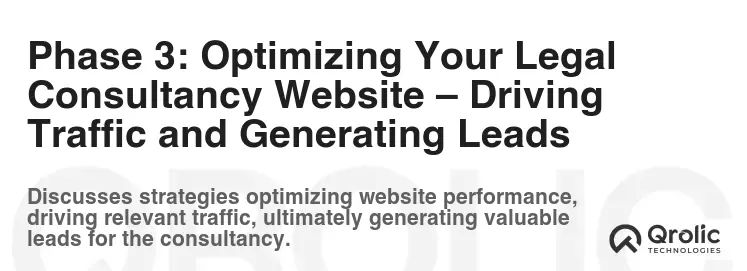
Once your website is live, it’s crucial to optimize it for search engines and user experience to drive traffic and generate leads.
1. On-Page SEO Optimization: Making Your Website Search-Engine Friendly
On-page SEO refers to the techniques you use to optimize your website’s content and structure for search engines.
- Keyword Integration: Strategically incorporate your target keywords into your website’s content, including page titles, headings, meta descriptions, and body text.
- Meta Description Optimization: Write compelling meta descriptions for each page on your website. Meta descriptions are short summaries of your page’s content that appear in search results.
- Heading Optimization: Use headings (H1, H2, H3) to structure your content and make it easier to read. Include relevant keywords in your headings.
- Image Optimization: Optimize your images by compressing them, using descriptive file names, and adding alt text. Alt text is a description of the image that is displayed if the image cannot be loaded.
- Internal Linking: Link to relevant pages within your website to improve user experience and SEO.
- Mobile Responsiveness: Ensure your website is mobile-responsive, meaning it will look good on all devices.
- Page Speed Optimization: Optimize your website’s speed by compressing images, using a caching plugin, and minimizing code.
2. Off-Page SEO Optimization: Building Authority and Backlinks
Off-page SEO refers to the techniques you use to build your website’s authority and reputation on the internet.
- Link Building: Earn backlinks from other websites by creating high-quality content that people will want to link to.
- Social Media Marketing: Promote your website and content on social media platforms.
- Online Directory Listings: List your legal consultancy in online directories such as Yelp, Avvo, and FindLaw.
- Guest Blogging: Write guest posts for other websites in your industry and include a link back to your website.
- Public Relations: Get your legal consultancy mentioned in news articles and press releases.
3. Content Marketing Strategy: Creating Valuable and Engaging Content
Content marketing is the process of creating and distributing valuable, relevant, and consistent content to attract and engage a target audience.
- Develop a Content Calendar: Plan your content in advance and create a content calendar to ensure you are consistently publishing new content.
- Write Blog Posts: Regularly publish informative and engaging blog posts on relevant legal topics.
- Create Infographics: Create visually appealing infographics to present complex legal information in an easy-to-understand format.
- Produce Videos: Create videos to explain legal concepts, share case studies, or provide legal advice.
- Develop Ebooks and White Papers: Create in-depth guides and reports on specific legal topics.
- Host Webinars: Host webinars to provide legal education and answer questions from your audience.
4. Website Analytics and Tracking: Measuring Your Success
Website analytics tools like Google Analytics allow you to track your website’s traffic and user behavior.
- Track Key Metrics: Track key metrics such as website traffic, bounce rate, time on site, conversion rate, and lead generation.
- Analyze User Behavior: Analyze user behavior to understand how people are interacting with your website and identify areas for improvement.
- Identify Traffic Sources: Identify your website’s traffic sources to understand where your visitors are coming from.
- Track Conversions: Track conversions to see how many visitors are converting into leads and clients.
- Use Data to Make Decisions: Use the data you collect to make informed decisions about your website’s design, content, and marketing strategy.
5. Conversion Rate Optimization (CRO): Turning Visitors into Clients
Conversion Rate Optimization (CRO) is the process of optimizing your website to increase the percentage of visitors who convert into leads and clients.
- Improve Website Design: Make sure your website is visually appealing, easy to navigate, and mobile-responsive.
- Write Compelling Copy: Write clear, concise, and persuasive copy that highlights the benefits of your services.
- Use Strong Calls to Action: Use strong calls to action to encourage visitors to take the next step, such as contacting you for a consultation.
- Simplify Forms: Simplify your contact forms to make them easier to fill out.
- A/B Testing: Use A/B testing to test different versions of your website and see which ones perform best.
- Offer Incentives: Offer incentives to encourage visitors to convert, such as free consultations or discounts.
Qrolic Technologies: Your Partner in Building a Successful Legal Consultancy Website

Qrolic Technologies (https://qrolic.com/) is a leading web design and development company that specializes in creating professional and effective websites for legal consultancies. We understand the unique challenges and opportunities faced by law firms in the digital age, and we are committed to helping our clients build a strong online presence that attracts new clients and drives business growth.
Our Services:
- Website Design and Development: We create custom website designs that are visually appealing, mobile-responsive, and optimized for search engines.
- SEO Optimization: We help you improve your website’s rankings in search results and attract more organic traffic.
- Content Marketing: We create high-quality content that engages your target audience and establishes your expertise.
- Social Media Marketing: We help you build a strong social media presence and connect with potential clients.
- Pay-Per-Click Advertising: We create and manage effective PPC campaigns that drive targeted traffic to your website.
- Website Maintenance and Support: We provide ongoing website maintenance and support to ensure your website is always up-to-date and secure.
Why Choose Qrolic Technologies?
- Experience: We have years of experience working with legal consultancies of all sizes.
- Expertise: Our team of designers, developers, and marketers are experts in their respective fields.
- Custom Solutions: We provide custom solutions that are tailored to your specific needs and goals.
- Results-Driven Approach: We are committed to delivering results that help you grow your business.
- Excellent Customer Support: We provide excellent customer support to ensure your satisfaction.
Contact us today to learn more about how Qrolic Technologies can help you build a successful legal consultancy website.
Staying Compliant: Legal Considerations for Your Website
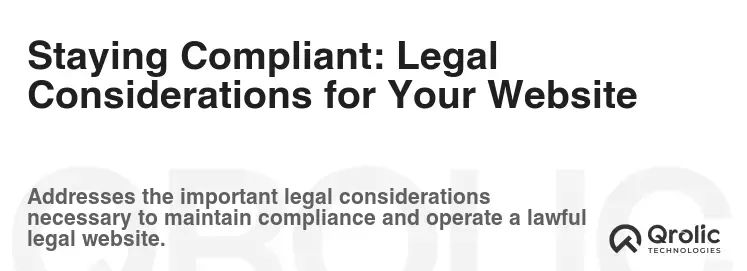
Navigating the legal landscape of online communication is crucial. Your website must adhere to specific regulations and ethical guidelines to maintain credibility and avoid legal issues.
- Advertising Regulations: Be aware of advertising regulations specific to your jurisdiction regarding claims made on your website. Ensure all statements are accurate and substantiated.
- Privacy Policies: A comprehensive privacy policy is essential, outlining how you collect, use, and protect visitor data. Comply with GDPR, CCPA, and other relevant data privacy laws.
- Terms of Service: Clearly define the terms of service for using your website, including disclaimers regarding legal advice and liability.
- Accessibility Compliance (WCAG): Make your website accessible to people with disabilities by following the Web Content Accessibility Guidelines (WCAG).
- Attorney Advertising Rules: Familiarize yourself with your jurisdiction’s rules regarding attorney advertising, including disclaimers and limitations on testimonials.
- Data Security: Implement robust security measures to protect sensitive client data from unauthorized access and cyber threats.
Regularly review and update your website’s legal policies to ensure compliance with evolving regulations. Consult with a legal professional to ensure your website meets all applicable requirements.
The Long Game: Maintaining and Updating Your Legal Consultancy Website
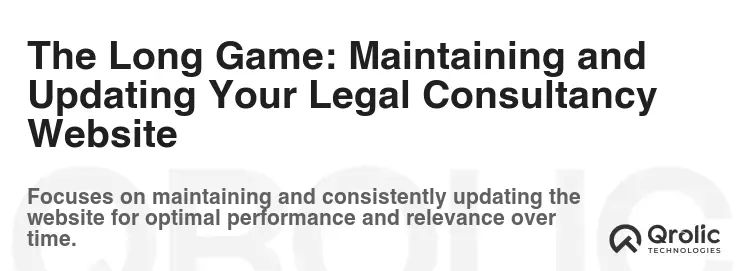
Creating a legal consultancy website is not a one-time project. It requires ongoing maintenance and updates to ensure it remains effective and relevant.
- Regular Content Updates: Continuously add new content to your website, such as blog posts, articles, and case studies, to keep your website fresh and engaging.
- Security Updates: Regularly update your website’s software and plugins to protect it from security threats.
- Design Updates: Periodically refresh your website’s design to keep it modern and visually appealing.
- SEO Updates: Continuously monitor your website’s SEO performance and make adjustments as needed.
- Performance Monitoring: Regularly monitor your website’s performance, including page speed and uptime, to ensure it is functioning optimally.
- User Feedback: Solicit feedback from your website visitors and use it to improve your website’s design, content, and functionality.
By following these essential steps, you can create a legal consultancy website that attracts new clients, builds trust, and helps you grow your business. Remember to plan carefully, design strategically, optimize for search engines, and continuously maintain and update your website to ensure its long-term success.


